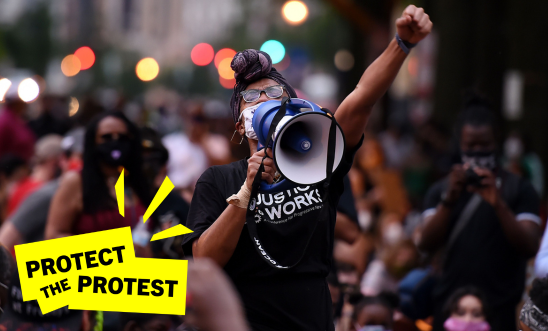
Protest is a Human Right

Protest is not only a human right. It is a powerful way to change the world.
In the UK, the right to protest is under threat. When it comes to protest rights in the UK, police forces decide your rights- they don’t protect them anymore.
Protest is a human right protected in the UK by Article 11 of the Human Rights Act, and it is protected under international law by provisions enshrined in various international and regional treaties.
No matter what our postcode is, we all want to live in a society where the government protects our rights. People in power are afraid of change and do not want to be held accountable. They want us to think coming together to protect our rights doesn’t work. By standing together, we have the power to fight back.
Why is protest important?
Peaceful protest is one of the most effective ways for the majority of us to have their voices heard. Protest is the reflection of public feeling underrepresented in politics, especially groups who are overlooked or ignored. To be heard, citizens band together in solidarity and demand their rights are respected.
Protest is a key tactic for humanity to win.
Positive change for human rights would not happen without the right to protest. Many of the great movements of our world’s history used protest and benefited humanity as a whole. Think about the suffragettes, civil rights movement, Indian independence, anti-apartheid in South Africa and Pride.
Movements for change stood firm and courageous in the face of repression like police brutality, imprisonment or worse. Countless rights and freedoms enjoyed today, like women being able to vote and workers able to enjoy weekends, have all been won by protesting against injustice.
What is the state of protest rights in the UK?
Protest is a human right.
Our right to protest is protected by the Human Rights Act.
Our right to protest is protected by international law.Don’t let anyone tell you different
— Amnesty UK (@AmnestyUK) May 6, 2023
In the UK, the right to protest is under threat. Westminster has repackaged the worst parts of the Police, Crime, Sentencing and Courts Act into a new Public Order Act. Amnesty UK urged MPs across divides to oppose this new Anti-Protest Bill in its entirety.
Commenting on the Public Order Act, Sacha Deshmukh, Amnesty UK's Chief Executive Director said:
“It follows a pattern of a government voicing support for protest around the world but cracking down on the right to speak up here at home.”
These new attempts to reduce protest rights are in breach of international human rights law. On September 2020, the UN Human Rights Council General Comment on the right to peaceful assembly stated:
“State parties should not rely on a vague definition of 'public order' to justify overbroad restrictions on the right of peaceful assembly. Peaceful assemblies can in some cases be inherently or deliberately disruptive and require a significant degree of toleration.”
For example, the government Serious Disruption Prevention Orders in the Public Order Bill go even further than Russian Law on Assemblies. In Russia, people convicted of protest-related offences are not allowed to organise protests.
What’s more, the Police, Crime, Sentencing and Courts Act already criminalises Roma, Travellers and nomadic communities.
What can we do about it?
Together, we can keep this fundamental freedom safe.
We must not allow this clamp down on our rights. Demand the Home Secretary scraps anti-protest laws today: